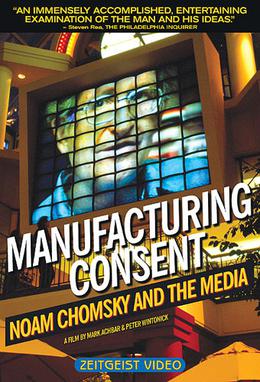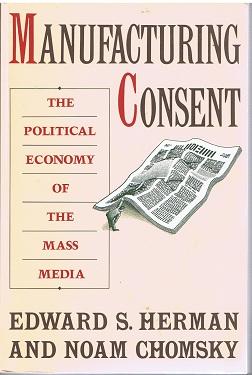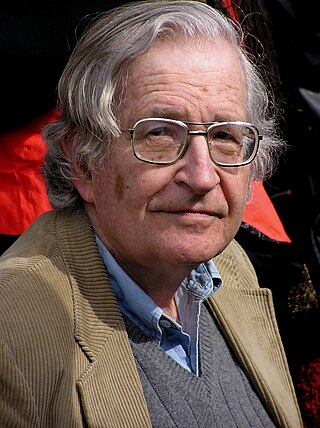
Manufacturing Consent: Noam Chomsky and the Media is a 1992 documentary film that explores the political life and ideas of linguist, intellectual, and political activist Noam Chomsky. Canadian filmmakers Mark Achbar and Peter Wintonick expand the analysis of political economy and mass media presented in Manufacturing Consent, a 1988 book Chomsky wrote with Edward S. Herman.

Manufacturing Consent: The Political Economy of the Mass Media is a 1988 book by Edward S. Herman and Noam Chomsky. It argues that the mass communication media of the U.S. "are effective and powerful ideological institutions that carry out a system-supportive propaganda function, by reliance on market forces, internalized assumptions, and self-censorship, and without overt coercion", by means of the propaganda model of communication. The title refers to consent of the governed, and derives from the phrase "the manufacture of consent" used by Walter Lippmann in Public Opinion (1922). The book was honored with the Orwell Award.

Avram Noam Chomsky is an American professor and public intellectual known for his work in linguistics, political activism, and social criticism. Sometimes called "the father of modern linguistics", Chomsky is also a major figure in analytic philosophy and one of the founders of the field of cognitive science. He is a laureate professor of linguistics at the University of Arizona and an institute professor emeritus at the Massachusetts Institute of Technology (MIT). Among the most cited living authors, Chomsky has written more than 150 books on topics such as linguistics, war, and politics. Ideologically, he aligns with anarcho-syndicalism and libertarian socialism.
ZNetwork, formerly known as Z Communications, is a left-wing activist-oriented media group founded in 1986 by Michael Albert and Lydia Sargent. It is, in broad terms, ideologically libertarian socialist, anti-capitalist, and heavily influenced by participatory economics, although much of its content is focused on critical commentary of foreign affairs. Its publications include Z Magazine, ZNet, and Z Video. Since early November 2022, they have all been regrouped under the name ZNetwork.

The propaganda model is a conceptual model in political economy advanced by Edward S. Herman and Noam Chomsky to explain how propaganda and systemic biases function in corporate mass media. The model seeks to explain how populations are manipulated and how consent for economic, social, and political policies, both foreign and domestic, is "manufactured" in the public mind due to this propaganda. The theory posits that the way in which corporate media is structured creates an inherent conflict of interest and therefore acts as propaganda for anti-democratic elements.
David Edwards is a British media campaigner who is co-editor of the Media Lens website with David Cromwell. Edwards specialises in the analysis of mainstream, or corporate, mass media, which are normally considered impartial or liberal, an interpretation both men believe is disputable.

Hegemony or Survival: America's Quest for Global Dominance is a book about the United States and its foreign policy written by American political activist and linguist Noam Chomsky. It was first published in the United States in November 2003 by Metropolitan Books and then in the United Kingdom by Penguin Books. It was republished by Haymarket Books in January 2024.
The following outline is provided as an overview of and topical guide to public relations:
Edward Samuel Herman was an American economist, media scholar and social critic. Herman is known for his media criticism, in particular the propaganda model hypothesis he developed with Noam Chomsky, a frequent co-writer. He held an appointment as Professor Emeritus of finance at the Wharton School of Business of the University of Pennsylvania. He also taught at Annenberg School for Communication at the University of Pennsylvania.
The NCTE George Orwell Award for Distinguished Contribution to Honesty and Clarity in Public Language is an award given since 1975 by the Public Language Award Committee of the National Council of Teachers of English. It is awarded annually to "writers who have made outstanding contributions to the critical analysis of public discourse."

Noam Chomsky is an intellectual, political activist, and critic of the foreign policy of the United States and other governments. Noam Chomsky describes himself as an anarcho-syndicalist and libertarian socialist, and is considered to be a key intellectual figure within the left wing of politics of the United States.

The Anti-Chomsky Reader is a 2004 anthology book about the linguist and social critic Noam Chomsky edited by Peter Collier and David Horowitz. Its contributors criticize Chomsky's political and linguistic writings, claiming that he cherry-picks facts to fit his theories.

Letters from Lexington: Reflections on Propaganda, first published in 1993, contains Noam Chomsky's criticism of the American media. The articles are available in parts on the Noam Chomsky Archive.
Manufacturing Consent: The Political Economy of the Mass Media is a 1988 book by Edward S. Herman and Noam Chomsky.
Counter-Revolutionary Violence: Bloodbaths in Fact & Propaganda is a 1973 book by Noam Chomsky and Edward S. Herman, with a preface by Richard A. Falk. It presented the thesis that the "United States, in attempting to suppress revolutionary movements in underdeveloped countries, had become the leading source of violence against native people".
This is a list of writings published by the American author Noam Chomsky.
Alexander Edward Carey was an Australian social psychologist who analysed corporate propaganda. Carey influenced Noam Chomsky, Edward S. Herman and was called a "second Orwell in his prophesies" by Australian journalist and author John Pilger.

Power Without Responsibility is a book written by James Curran and Jean Seaton. Originally published in 1981 by Fontana, it has been translated into several languages and is now in its eighth edition. The title comes from a quotation by the writer Rudyard Kipling; though it is widely attributed to Stanley Baldwin, the former Prime Minister of the United Kingdom, he was quoting Kipling. It details the history of the news media in the UK from the eighteenth century to the present.

Cambodian genocide denial is the belief expressed by some Western academics that early claims of atrocities committed by the Khmer Rouge government (1975–1979) in Cambodia were much exaggerated. Many scholars of Cambodia and intellectuals opposed to the US involvement in the Vietnam War denied or minimized reports of human rights abuses of the Khmer Rouge, characterizing contrary reports as "tales told by refugees" and US propaganda. They viewed the assumption of power by the Communist Party of Kampuchea as a positive development for the people of Cambodia who had been severely impacted by the Vietnam War and the Cambodian Civil War. On the other side of the argument, anti-communists in the United States and elsewhere saw in the rule of the Khmer Rouge vindication of their belief that the victory of Communist governments in Southeast Asia would lead to a "bloodbath."

The Political Economy of Human Rights is a 1979 two-volume work by Noam Chomsky and Edward S. Herman. The authors offer a critique of United States foreign policy, particularly in Indochina.










